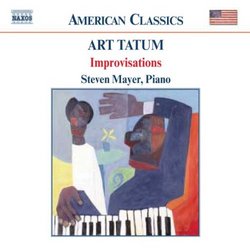An Homage That Strides, Boogies and Swings!
J Scott Morrison | Middlebury VT, USA | 10/20/2004
(5 out of 5 stars)
"There is certainly no desperate need for recordings of new non-Tatum performances of Art Tatum's fantastic jazz improvisations since most of his recordings from the 1930s through the 1950s exist in multiple CD reincarnations. But as an act of homage (and intense work on his part, I must say) pianist Steven Mayer has recorded seventeen of Tatum's improvisations note-for-note, transcribed by ear from Tatum's recordings and played with real panache here. His renditions are not precisely identical to Tatum's and therein lies part of their value. Although all the notes that Tatum laid down are there, there are little variations in accentuation, rhythmic and dynamic, as well as slight tempo alterations, that make these performances worth having because of one's ability to hear these improvisations anew. Add to that Mayer's impressive virtuosity and the excellent modern sound caught in these recordings (not to mention Naxos's budget price) and you have reason enough, I feel, to invest in them if you are, as I, a big fan of Tatum's incredible artistry.
I imagine that some people buying this CD will not have a collection of Tatum's own originals. And are they ever in for a delightful time of it! Tatum's stride basses, right hand tracery at supersonic speed, increasingly complex harmonies, unfailing sweetness and humor are in full evidence here. He always acknowledged his debt to Fats Waller and, like Waller, there is a joie de vivre in his music that simply can't be denied. Mayer catches that tone admirably.
I can't comment on all the tracks here, but some do invite a word or three. Since I come from the classical music side of things, I must point out the droll and yet lovely interpretation of Dvorák's 'Humoresque,' which starts out fairly 'straight' (albeit with flippant alterations of rhythm that make one chuckle) and then all heck breaks loose in the second chorus. I have to imagine Dvorák, with his experience of the exuberance of American music, would be smiling. And then there is Tatum's treatment of Massenet's sappy 'Élegie,' which Tatum starts at its lugubrious original tempo, but is barely into the second phrase before it's as if he says 'enough of this' and speeds things up, layers in absolutely miraculous right-hand filigree leading to breakneck stride (with those amazing walking tenths in the left hand) and makes something entirely original and invigorating of it.
Among the real classics here is Tatum's 1940 'Sweet Lorraine,' which is so sophisticated in its subtle alterations in the tune at each reappearance that 'a first time listener who comes in the room in the midst of the solo almost cannot be sure that he is not hearing the actual tune,' as Mayer says in his enlightening booklet notes. This is another of Tatum's delicately sweet improvisations that somehow manages to swing at the same time as it caresses us with its gentle sentiment. Finally, simply because I worry about becoming too enthusiastically long-winded here, I'll end by singling out 'Lover, Come Back to Me,' which is so harmonically rich and subtle that I can't but think that Tatum's illustrious successors such as Bill Evans, George Shearing and Denny Zeitlin (and probably countless others) must have memorized the changes to use in the development of their own styles. It is stunning evidence of Tatum's continuing evolution as an artist over the years until his tragic and untimely death from uremia at 47 in 1956.
Steven Mayer, a classical virtuoso of the first stripe--if you don't believe me, you should listen to his recently released recording of Ives's 'Concord Sonata'--has made something of a career of mixing High Art of the European variety with the High Art of American jazz pianist/composers like Tatum, James P. Johnson and Jelly Roll Morton. One hopes there will be many more CDs like this one. My goodness, there's still a lot of Tatum to record, Mr Mayer! And wouldn't I love to hear your take on Meade Lux Lewis and Earl 'Fatha' Hines and Erroll Garner and even that Russian slyboots Nikolai Kapustin!
Strongly recommended.
TT=62:00
Scott Morrison"
A very good reproduction!
J. C. Verheul | 09/11/2005
(5 out of 5 stars)
"Steven Mayer did in my view a very good job in reproducing the sound of Tatum. The tracks are all very interesting to hear for a Tatum admirer. Mayer plays most of the songs a little bit slower than Tatum did. No problem at all. The decreased speed allows one to hear even better how good Tatum was, and how well-formed his improvisations were. Essential in imitating Tatum is the ability to play tenths with your left hand, which most pianist can not. Mayer plays tenths and tenth-based big chords effortless. Most of the tracks seem to have been played from the transcriptions in "The Art Tatum Collection" (publisher Hal Leonard, available here with Amazon.com). Mayer has proven that you don't have to be Tatum to play like Tatum. Who's next?
"


 Track Listings (17) - Disc #1
Track Listings (17) - Disc #1